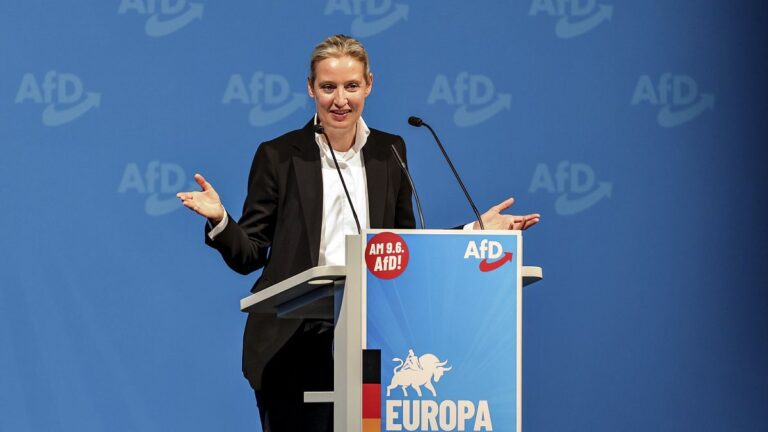Called “Sovereign States Europe,” the new grouping immediately became the most radical force on the right in the European Parliament.
advertisement
A new far-right group called “Sovereign States Europe” (ESN) has been formed in the European Parliament, bringing together controversial parties that previously lacked political affiliation due to the extremism of their ideologies.
This composition includes 25 MEPs from eight member states, enough to establish a formal semicircular group and avoid a non-affiliated category that would significantly reduce MEPs’ importance and speaking time.
The party’s structure and name were announced on Wednesday afternoon after its inaugural meeting in Brussels, ending days of growing speculation. The news came just two days after Prime Minister Viktor Orbán’s “Patriots for Europe” was born, cementing the far-right’s realignment after June’s elections.
Despite their diverse nature, ESN’s eight parties are united by vehement opposition to migration control, the Green Deal, social progressivism and military aid to Ukraine, putting them on a collision course with the mainstream.
Moreover, they are all opposed to the European Integration Plan, in which states would forge political and economic union by delegating some of their powers to supranational institutions, hence the word “sovereignty” prominently in the plan’s title.
The sovereign states of Europe consist of the following countries:
Alternative for Germany (AfD) in Germany: 14 MEPs Confederation of Poland: 3 MEPs Reconstruction of Bulgaria: 3 MEPs Reconquistador in France: 1 MEP Slovak Republic: 1 MEP Czech Freedom and Direct Democracy (SPD): 1 MEP Homeland Movement in Hungary: 1 MEP Lithuanian Alliance of People and Justice: 1 MEP
Who are the members of the new group?
The leading voice in this group is the AfD, which holds more than half of the seats in the European parliaments. One of its MPs, René Aust, was named co-chair. The other is Stanisław Tyszka of the Federalist Party.
“We are united because we share the goal of significantly influencing the political future of Europe through decisive action and strategic planning. European history shows that this can only be achieved collectively. Influence has always been exerted by those who have the courage to organise and act strategically,” Aust and Tyszka said.
“We choose this path not because it is easy, but because it is necessary to realize our common vision of a strong, united and forward-thinking Europe of our homelands.”
Perhaps one of the most notorious far-right parties in Europe, the AfD is accused of promoting ethno-nationalist beliefs, spreading Islamophobia, engaging in historical revisionism and denying the existence of man-made climate change.
Earlier this year, investigative journalism organisation Kollektif revealed that AfD leaders had attended meetings to discuss a “re-migration” plan to deport asylum seekers, foreign residents and “unaffiliated” German citizens. The report sparked outrage and sparked weeks of mass protests.
In May, a German court formally designated the AfD a suspect in charges of extremism, allowing intelligence agencies to monitor its activities and communications.
Later that month, the AfD was expelled from its now-disbanded Identity and Democracy (ID) group after its then-chairman Maximilian Kula told an Italian newspaper that not everyone who wore an SS uniform was a war criminal. Separately, Kula’s assistant was arrested on suspicion of spying for Chinese intelligence and his offices were raided.
The AfD’s non-affiliation stance fuelled speculation for weeks about the possibility of a new grouping in Brussels, initially thought to be called “sovereigntists.”
Other members include Poland’s Konfederacja, a strongly anti-LGBTQ, anti-feminist and anti-abortion coalition, but only three of the six MEPs elected under Konfederacja have joined the new group.
Anna Bryka, a member of the European Parliament, said she would not take part because of the group’s “attitude” towards the Nord Stream pipeline linking Europe and Russia, which Poland strongly opposes.
“At the same time, I declare my intention to cooperate with all European forces that want to block gradual federalization, mass and uncontrolled migration and the European Green Deal,” Briuca said on social media, explaining his decision.
Sovereign Europe also includes the Bulgarian Revival, the Hungarian Fatherland Movement (MHM), the Czech Republic’s Free and Direct Democracy (SPD), France’s Reconquista!, and the Slovak Republic, all of which claim to be ultranationalist and ultraconservative and promote nationalist and xenophobic themes.
advertisement
Parties such as Revival, Fatherland Movement and Republika have been associated with the anti-vaccination movement. A friendly stance towards Russia is also a recurring theme among ESN members.
Overall, this group could easily be considered the most radical organisation in the European Parliament and would be immediately put on red alert by mainstream forces and stripped of any senior positions in Parliament.
The controversial SOS Romania party, which seemed like a suitable candidate, was rejected after some delegates, including the AfD and the Our Homeland Movement, expressed concerns. Among other extreme proposals, SOS Romania wants to redraw the map of Eastern Europe and re-establish the interwar kingdom of “Greater Romania”.
Another notable absence is the Spanish “Party is Finished” (“Se Acabó La Fiesta”, or SALF for short), a self-described “anti-system” political party led by social media influencer Luis “Alvise” Pérez. Contrary to previous media reports, SALF has not joined the far-right group.

